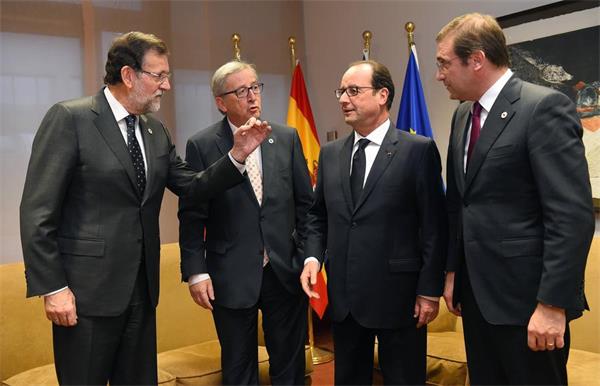EU needs to consider its New Year resolutions
Updated: 2014-12-30 07:56
By Fu Jing(China Daily)
|
||||||||
 |
|
(L-R) Spanish Prime Minister Mariano Rajoy Brey, European Commission President Jean-Claude Juncker, French President Francois Hollande and Portuguese Prime Minister Pedro Passos Coelho meet European Union leaders summit in Brussels, on December 18, 2014. EU leaders gathered in Brussels on Thursday seeking common ground on a long-term strategy to deal with an unfriendly but economically wounded Russia. [Photo/Agencies] |
As the New Year approaches, it is a time to look back at the year that is ending.
But in terms of Europe, the recent Ukraine crisis and Russia's consequent economic difficulties have led me to think beyond the 12 months of 2014.
Let's start, instead, by rewinding back to 2008, when the 28-member European Union was battered by the financial crisis and its home-made sovereign debt upheavals.
At the very beginning of the crisis, many forecast that the world would experience a decade of lost economic growth and the EU has already suffered from two economic recessions since 2008 and another is looming. With the United States having obviously stepped out of crisis at a quicker pace than the EU, the latter must rethink its rigid and insufficient institutional arrangements and political system if it is to regain economic vitality.
The EU's political system, especially its political power struggle games, have already aggravated the effects of the crisis stemming from the US subprime meltdown and the European sovereign debt crises, as the prolonged debates and struggles have caused political uncertainty and meant chances for propelling economic recovery have been missed.
The EU is not only facing a lost decade economically and the attendant internal instability and uncertainties stemming from that, but also a decade of political instability in its neighborhood.
Putting the bloc's debt crisis, the uncertainties in North Africa and Ukraine, and the Russian currency trouble together, it is easy to predict that due to the interlocking economic relations the pace of any EU economic recovery will be slow.
Since World War II, the Western European countries have been forging a project of peace and an economic and monetary union. The EU now has 28 members; and with Lithuania starting to use euro in the beginning of 2015, the eurozone will cover 19 countries.

 Music at her fingers
Music at her fingers
 Across America Over the Week (Jan 16 - Jan 22)
Across America Over the Week (Jan 16 - Jan 22)
 Spend Chinese New Year in style
Spend Chinese New Year in style
 Ili river valley becomes a popular destination for swans
Ili river valley becomes a popular destination for swans
 Philip Ma: from scientist to businessman
Philip Ma: from scientist to businessman
 Birmingham's Spotlight on China dinner
Birmingham's Spotlight on China dinner
 How to distinguish doucai, wucai, Famille-rose and enamel porcelain
How to distinguish doucai, wucai, Famille-rose and enamel porcelain
 Xinjiang lake in bumper fishing season
Xinjiang lake in bumper fishing season
Most Viewed
Editor's Picks

|

|

|

|

|

|
Today's Top News
Houston's SW Chinatown
China to focus on reforms, opening of capital market
Slowdown brings new risks to banks
Trade group calls for BIT
Market status for China is 'political' issue
Birmingham's Spotlight on China dinner
Bank takes renminbi-clearing seriously
Traditional Garb
US Weekly

|

|








